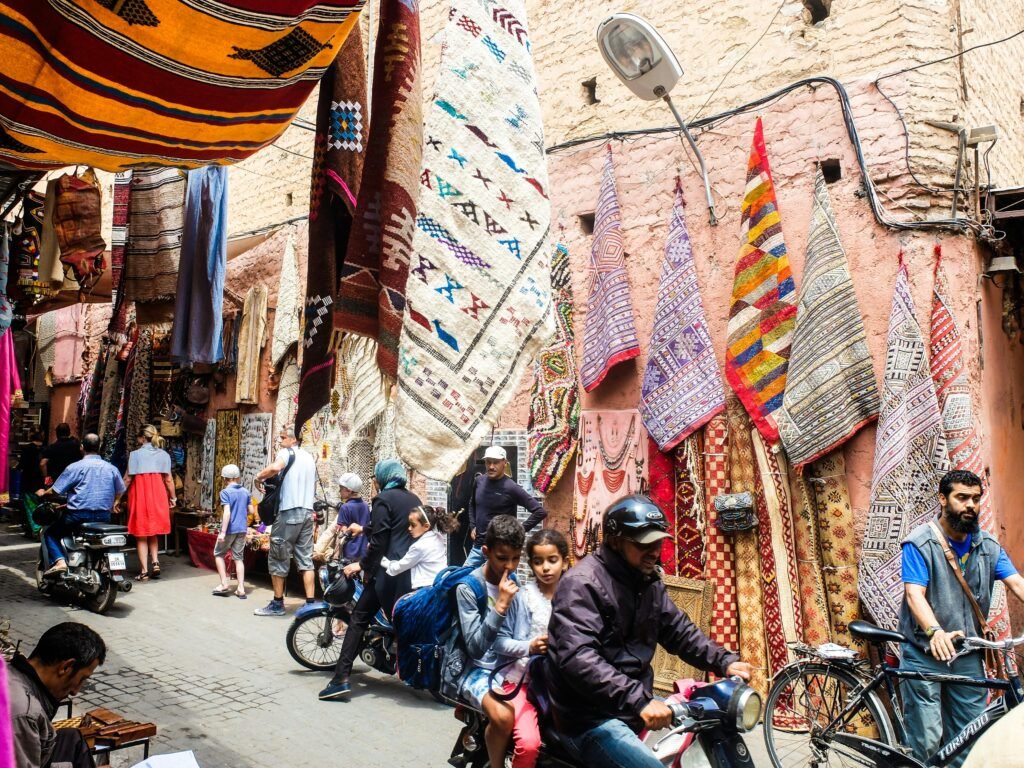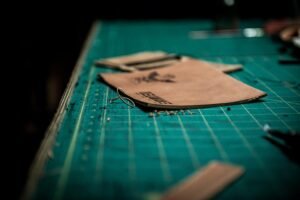Navigating the Legal Landscape of Alligator Leather Trade
Alligator leather is a highly coveted material, known for its durability and unique texture, but navigating the legal landscape of its trade can be complex. With regulations varying from country to country, it is crucial to understand the legal requirements when it comes to buying or selling alligator leather products. From permits to restrictions, this article will provide you with a comprehensive overview of the legal regulations surrounding the alligator leather trade, ensuring you make informed and ethical choices in this fascinating industry.

This image is property of images.unsplash.com.
Overview of Alligator Leather Trade Regulations
Introduction to alligator leather trade
Alligator leather is a highly sought-after material that is used in the production of various luxury goods like handbags, shoes, and watch straps. The trade of alligator leather plays a significant role in the fashion and accessories industry, providing a unique and exotic option for consumers. However, due to concerns regarding the conservation and welfare of alligators, there are strict regulations in place to govern the trade and ensure its sustainability.
Importance of regulations in the trade
Regulations in the alligator leather trade are crucial for several reasons. Firstly, they aim to protect the endangered status of alligator species by preventing over-harvesting and illegal poaching. Secondly, these regulations promote sustainable practices in alligator farming, ensuring that the industry does not exploit the resources or harm the natural habitats of alligators. Lastly, regulations help maintain the integrity and ethical standards of the trade, addressing animal welfare concerns and promoting transparency in the supply chain.
Key regulations governing the trade
The alligator leather trade is subject to both international and domestic regulations. Internationally, the Convention on International Trade in Endangered Species of Wild Fauna and Flora (CITES) plays a crucial role in governing the trade. Domestic regulations differ from country to country, with the United States having its own set of regulations, including the Lacey Act. These regulations work in tandem to ensure the sustainable and ethical trade of alligator leather.
International Regulations
Convention on International Trade in Endangered Species of Wild Fauna and Flora (CITES)
CITES is an international agreement between governments aimed at ensuring that the international trade of wildlife does not threaten their survival. Alligator species, such as the American alligator (Alligator mississippiensis), are listed under Appendix II of CITES. This listing means that trade in alligator leather products requires proper documentation, including CITES permits, to demonstrate that the products were sourced legally and sustainably.
Role of CITES in alligator leather trade
CITES plays a significant role in regulating the alligator leather trade by facilitating cooperation between countries to monitor and control the international trade of alligator products. It sets standards for the issuance of permits and monitors the trade to prevent illegal activities. CITES also provides a platform for countries to share information, collaborate, and address conservation and trade-related issues collectively.
CITES permits and regulations for import and export
To trade alligator leather internationally, individuals and businesses must obtain CITES permits. These permits serve as proof that the products were legally sourced and traded in compliance with CITES regulations. The permits require detailed information about the products, including the species, quantity, and origin of the alligator skins or leather. Additionally, import and export regulations may vary from country to country, and compliance with both CITES and domestic regulations is essential for a smooth and legal trade.
Domestic Regulations
United States regulations on alligator leather trade
In the United States, the trade of alligator leather is governed by several federal regulations. The U.S. Fish and Wildlife Service (USFWS) oversees the management and conservation of alligator populations and regulates their harvest and trade. All individuals and businesses involved in alligator farming, harvesting, and trade must comply with these regulations to ensure the sustainability and legality of the industry.
Alligator farming and harvesting regulations in the US
Alligator farming in the United States is regulated under the Endangered Species Act and the National Wild and Scenic Rivers Act. These regulations aim to manage and sustain alligator populations through controlled farming practices. Alligators are farmed in captivity, providing a sustainable source of alligator leather, while minimizing the impact on wild alligator populations. Strict regulations govern farming operations, including animal welfare standards, sanitary conditions, and record-keeping requirements.
Lacey Act and its impact on alligator leather trade
The Lacey Act is a U.S. federal law that prohibits the trade of wildlife, fish, and plants that have been illegally sourced, possessed, transported, or sold. This act also applies to alligator leather trade, ensuring that products entering or leaving the United States comply with domestic and international regulations. It strengthens the efforts to combat illegal trade, protect alligator populations, and promote ethical practices within the industry.
Legal Challenges and Controversies
Challenges in implementing and enforcing regulations
While regulations exist to govern the alligator leather trade, the implementation and enforcement of these regulations pose significant challenges. One challenge is ensuring compliance across international borders, as different countries may have varying levels of commitment and resources allocated to monitor the trade. Additionally, the complex nature of the supply chain makes it difficult to trace the origin and legality of alligator leather products, making it easier for illegal trade to take place.
Illegal trade and poaching issues
Illegal trade and poaching pose serious threats to alligator populations and the sustainability of the alligator leather trade. Poachers often target protected areas or engage in illicit activities to source alligator skins without adhering to regulations. This illegal trade undermines conservation efforts, depletes alligator populations, fosters corruption, and affects the overall integrity of the industry. Governments, law enforcement agencies, and conservation organizations must work together to combat such activities and protect these endangered species.
Ethical concerns surrounding alligator leather trade
The alligator leather trade is not without its ethical concerns. Animal welfare is a significant consideration, as the harvesting of alligator skins involves killing the animals. While regulations exist to ensure humane methods of harvesting, critics argue that the commercial exploitation of animals for fashion purposes is inherently unethical. This raises questions about the moral justifiability of using alligator leather and drives the demand for alternative materials that do not involve the harm or killing of animals.

This image is property of images.unsplash.com.
Sustainable Sourcing and Certification
Sustainable practices in alligator farming
Sustainable alligator farming practices are aimed at minimizing the ecological impact and ensuring the long-term viability of alligator populations. Farms implementing sustainable practices prioritize the welfare of the animals, maintain suitable conditions for their growth and reproduction, and avoid over-harvesting. Sustainable farming also includes responsible waste management, reduced use of resources, and measures to safeguard the natural habitats of alligators.
Certification programs for sustainable alligator leather
Certification programs play a crucial role in promoting sustainable alligator leather. These programs ensure that alligator leather products meet specific standards for sustainability and ethical practices. Well-known certification schemes like the Responsible Alligator and Crocodile Standards (RACS) provide assurance to consumers that the products they purchase have been sourced and produced responsibly. By supporting certified products, consumers contribute to the demand for sustainable leather, encouraging more ethical practices within the industry.
Traceability and transparency in the supply chain
Traceability and transparency in the supply chain are essential for identifying the source of alligator leather and verifying its legality and sustainability. By implementing systems that track the entire journey of alligator skins, from farm to finished product, stakeholders can ensure that the trade complies with regulations and ethical standards. Emerging technologies, such as blockchain, have the potential to revolutionize traceability, creating immutable records that provide transparency and build trust among consumers and stakeholders.
Ethical Considerations in Alligator Leather Trade
Animal welfare concerns
Due to the inherent nature of harvesting alligator leather, animal welfare is a primary ethical concern. Critics argue that rearing alligators in captivity for the sole purpose of obtaining their skins for fashion is unethical. They advocate for alternatives that do not involve animal harm, reducing the demand for alligator leather altogether. However, proponents of the industry argue that sustainable farming practices and humane harvesting methods can mitigate these ethical concerns, ensuring that the animals are treated with respect and dignity.
Alternatives to alligator leather
The ethical concerns surrounding alligator leather have spurred the development and popularity of alternative materials in the fashion industry. Faux leather, made from synthetic materials, and innovative plant-based materials offer a cruelty-free alternative to alligator leather. These alternatives aim to replicate the look and feel of the genuine material, allowing consumers to make ethical choices without sacrificing style or quality. The advancement and acceptance of these alternatives provide viable options for those seeking more ethical fashion choices.
Public perception and consumer demand
Public perception and consumer demand play a significant role in driving the ethical considerations surrounding the alligator leather trade. As awareness of animal welfare and sustainability issues increases, consumers are becoming more conscious and discerning in their purchasing decisions. This shift in consumer behavior has prompted fashion brands to respond by offering more transparency in their supply chains and incorporating sustainable practices. Ultimately, public perception and demand have the power to shape the future of the alligator leather trade.

This image is property of images.unsplash.com.
Enforcement and Penalties
Efforts to combat illegal trade
Law enforcement agencies and organizations are continuously working to combat illegal trade in alligator leather. Increased surveillance, intelligence sharing, and collaboration between countries and agencies strengthen efforts to detect, apprehend, and prosecute criminals involved in illegal activities. Enhanced penalties for offenders, as well as stricter regulations and inspections, act as deterrents. By focusing on both prevention and punishment, these efforts contribute to safeguarding alligator populations and maintaining the integrity of the trade.
Penalties for violating regulations
Violating regulations in the alligator leather trade can result in significant penalties. Penalties may include fines, imprisonment, or substantial financial sanctions. These penalties act as deterrents, discouraging individuals and businesses from engaging in illegal or unethical practices. The severity of the penalties emphasizes the importance of compliance and ethics within the industry.
Collaboration between law enforcement agencies
Given the transnational nature of the alligator leather trade, collaboration between law enforcement agencies is vital to effectively combat illegal activities. International cooperation through platforms like INTERPOL and regional task forces enables the sharing of intelligence, expertise, and resources. By working together, law enforcement agencies can better identify and target criminal networks involved in the illegal trade, leading to increased arrests, dismantling of smuggling networks, and better protection of alligator populations.
Role of Non-Governmental Organizations
NGOs involved in alligator conservation and protection
Various non-governmental organizations (NGOs) play a significant role in the conservation and protection of alligator populations. These organizations work towards ensuring the sustainable use of alligator resources, promoting responsible farming practices, and combating illegal trade and poaching. NGOs also engage in research, education, and advocacy activities to raise awareness and promote the ethical treatment of alligators in the context of the leather trade.
Campaigns and initiatives against unethical practices
NGOs often initiate campaigns and initiatives to raise public awareness about unethical practices in the alligator leather trade. These campaigns aim to educate consumers, media, and policymakers about the importance of sustainable sourcing and ethical considerations. They shed light on the potential environmental and social impacts of the trade, empowering individuals to make informed choices and demand change from the industry.
Partnerships with businesses and governments
NGOs forge partnerships with businesses and governments to address the challenges and enhance the impact of their efforts. Collaborating with fashion brands, NGOs promote sustainable sourcing, responsible business practices, and transparency within the supply chain. Partnerships with governments enable NGOs to influence policy decisions, advocate for stricter regulations, and participate in the enforcement of laws. By working together, these stakeholders contribute to the conservation and ethical advancement of the alligator leather trade.
Future Outlook and Trends
Advancements in sustainable alligator farming
Continuous advancements in sustainable alligator farming are expected to shape the future of the alligator leather trade. Improvements in farming practices, such as increased efficiency, reduced waste, and enhanced animal welfare, will contribute to the industry’s sustainability and mitigate environmental concerns. Technological innovations, such as genetic research and selective breeding, may also lead to the production of more resilient and disease-resistant alligators, ensuring the long-term viability of the industry.
Shifting consumer preferences and demands
The ongoing shift in consumer preferences and demands has the potential to influence the alligator leather trade significantly. As ethical considerations continue to gain prominence, consumers are increasingly seeking products that align with their values. This trend has led to a growing demand for sustainable and cruelty-free alternatives to alligator leather. Fashion brands that adapt to these changing preferences and offer transparent and ethical products will likely thrive in the future market.
The potential impact of new technologies
New technologies, such as blockchain traceability and alternative materials development, have the potential to revolutionize the alligator leather trade. Blockchain technology can provide transparent and immutable records for alligator leather products, ensuring traceability and increasing consumer trust. Innovations in alternative materials, including lab-grown leather, offer a sustainable and cruelty-free substitute for alligator leather. These technologies can drive positive change in the industry and shape its future direction.
Conclusion
Summary of key points
The trade of alligator leather is regulated by international and domestic regulations, including CITES and country-specific laws. These regulations are essential to protect alligator populations, promote sustainable practices, and address ethical concerns. Challenges in implementing and enforcing regulations, illegal trade, and ethical considerations pose ongoing issues within the industry. Sustainable sourcing, ethical alternatives, and consumer demand for transparency and responsible practices are shaping the future outlook of the trade.
Importance of continued regulation and ethical practices
Continued regulation and ethical practices in the alligator leather trade are vital for the conservation of alligator species and the long-term sustainability of the industry. Ensuring compliance with regulations, combating illegal trade, and promoting sustainable sourcing are critical to protect alligator populations and their habitats. The enforcement of penalties and collaborations between stakeholders further strengthen the industry’s integrity and contribute to its positive development.
The balance between conservation and commerce
The alligator leather trade operates at the intersection of conservation and commerce. Striking a balance between these two aspects is crucial for the responsible and sustainable growth of the industry. By implementing and adhering to ethical practices, prioritizing animal welfare, and investing in sustainable farming techniques, the trade can continue to meet consumer demands while safeguarding the welfare and survival of alligators. With the collaboration of governments, NGOs, and businesses, the alligator leather trade can flourish while ensuring conservation efforts remain a priority.



